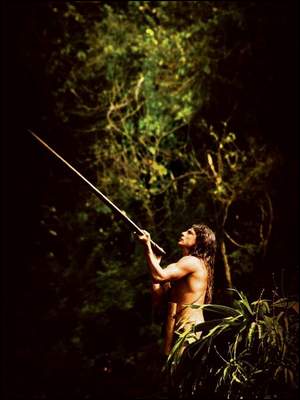By Juan Forero
Archaeologists, many of them Americans, say the opposite is true: This patch of forest, and many others across the Amazon, was instead home to an advanced, even spectacular civilization that managed the forest and enriched infertile soil to feed thousands.
The findings are discrediting a once-bedrock theory of archaeology that long held that the Amazon, unlike much of the Americas, was a historical black hole, its environment too hostile and its earth too poor to have ever sustained big, sedentary societies. Only small and primitive hunter-gatherer tribes, the assumption went, could ever have eked out a living in an unforgiving environment.
But scientists now believe that instead of stone-age tribes, like the groups that occasionally emerge from the forest today, the Indians who inhabited the Amazon centuries ago numbered as many as 20 million, far more people than live here today.
Along the Xingu, an Amazon tributary in Brazil, Michael Heckenberger of the University of Florida has found moats, causeways, canals, the networks of a stratified civilization that, he says, existed as early as A.D. 800. In Bolivia, American, German and Finnish archaeologists have been studying how pre-Columbian Indians moved tons of soil and diverted rivers, major projects of a society that existed long before the birth of Christ.
The evidence also suggests that the movies portraying lost jungle civilizations have some basis in fact. But these lost civilizations didn't build massive temples so they could sacrifice people to their dark gods. They built farms, irrigation systems, and villages of wooden structures.
When you see a movie such as The Librarian: Quest for the Spear, think about it. Where did the stones for a massive temple come from, and how did the Indians lug them through the forest? Answer: They didn't. It's illogical, and it implies the Indians were too irrational to understand the time and energy they were wasting. In reality, they had better things to do than build temples for Indiana Jones types to discover.
For more on the subject, see What "Primitive" Indians Really Think and Amazon Towns Disprove Stereotypes.
Below: Historically speaking, the exception, not the rule.


2 comments:
http://www.theonion.com/articles/archaeologists-unearth-lousiest-civilization-ever,18049/
I wonder if this Onion article was written in direct response to this article. It's a pretty decent parody and I noticed too not once did they use the words Indian, Native, or indigenous.
I saw that piece too. You could be right about its being a response.
For more on the subject, see Worst Indian Civilization Ever?
Post a Comment